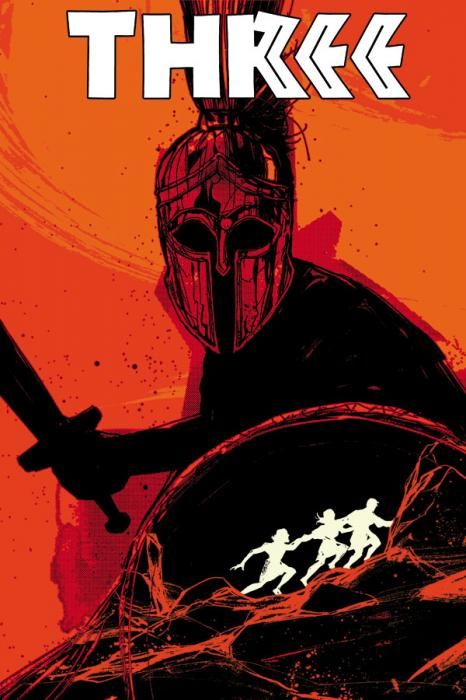In its penultimate issue, "Three" drives toward the Helots' final stand with a half dozen deaths and an unexpected enemy. Having built up the world through the first three issues, the creative team now moves swiftly toward the bloody denouement.
Kelly and Bellaire paint a world where, as Aristodemos says, "fear reigns supreme." Even the open fields are gray and inhospitable, dotted with brooks and streams that look dull, almost polluted. When the dogs close in and the Spartan army marches closer, the landscape morphs even further, from unfriendly to unsettling. On top of all that, Kelly's faces are drawn with fear and paranoia that I could feel in my gut. They're doing remarkable stuff here, and Cowles' subtle, well-planned lettering completes it.
Still, the use of silence remains one of my favorite things about this series. It provided this week's stand-out sequence. After the Spartans murder a small group of Helots, the next panel zeroes in on one Helot's severed head and slowly pans out to the marching horde over the next three panels. It's horribly chilling. In addition, when the dogs are approaching, they're not given any sound effects or onomatopoeia: just a dark panel of the pack whipping through the woods, followed by the Helots looking at each other in fear. Kelly and Bellaire have created a world that's so scary that Gillen doesn't need to explain why anyone should be afraid. The art simply shows it.
That said, Gillen finds time through the gloom to add nice ironic touches, such as the heavily armored, shield-bearing Spartan asking the un-armored Klaros, "A fair fight is less to your liking, Helot?" Terpander also gets in some fun lines about Klaros and Damar's flirting, which are all the more absurd for the fact that he has a nipple hanging out the entire time.
The script also looks at how words become real to the people who hear and use them, particularly in a system where violence is so much more effective. As in the first issue, bold words are the Three's undoing. Aristodemos the Skirites' professed class consciousness and strong words against the Spartans, along with his material kindness, win them over. To the Helots who've killed their masters, these aren't words someone would feign. They're real, in the sense that they're inextricably tied to concrete, consequence-inducing actions. To Aristodemos, who doesn't live under the Spartan thumb and exploits their fears to make a living, these words are not real. They're ideas to play with. Terpander's story became real when he told it to the wrong audience. Similarly, the King pushes his culpability onto the state when he corrects his followers: these aren't his orders, they're Sparta's.
These examinations aside, it still comes down to violence. So Klaros, the "butcher", is the only one of the Helots left with any options at issue's end. He could land on any number of actions, from a triumphant final showdown to a brutal act of class betrayal, and the statement of the series will largely hinge on what he decides.
It all started with a story, but it's going to end with a sword. This is Sparta, after all.

